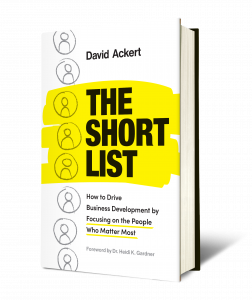How Much Time Do You Really Need to Spend on Business Development?
Whether you’re a lawyer, CPA, financial advisor, engineer, consultant, or other busy service professional, you are tasked with selling the service you provide, which means you have to contend with the opposing forces of developing business and servicing your clients.
How do you strike a proper balance between doing existing work and bringing in guaranteed revenues versus venturing into your network to pursue opportunities that may or may not work out?
The key is to know when to economize and when to promote. Economizing means keeping your head down, coping with your existing clientele, and minimizing extraneous activity. Promoting, on the other hand, means attending events, asking for introductions to prospective clients, writing articles, giving presentations, and any number of other marketing and business development techniques.
There is no magic ratio of economization and promotion that will work all the time. You need to assess the condition of your business and respond appropriately. And to recognize this, you need to keep track of your revenue statistics over time. This can be easily accomplished with accounting software, CRM, or even an Excel spreadsheet.
When Revenues are Flatlining or Declining
When your revenues have been flatlining—or even declining—the initial instinct can be one of panic. The immediate thought most service professionals have is something along the lines of, “I can’t possibly afford to take time for business development right now. I need to focus on billing hours.” The urge to economize, however, is actually the opposite of what you should do because when existing work runs out, and you don’t have any new clients lined up, you’ll be even worse off than where you started.
When you find yourself coasting on a flat or slightly declining income, it’s time to promote. Take time every week to ask your contacts for referrals, offer a free consultation to a prospective client, or attend networking events with business potential. It may stress you out in the moment, but you’ll thank yourself later.
Once you’ve promoted enough to build up a sustainable book of business, you can economize, focus on the work, and make sure you incorporate enough business development time into your schedule to prevent your income from flatlining again in the future.
When Revenues are Static or Gradually Inclining
If your revenue is static or on a gradual incline over time, you’ve hit a sweet spot. Whatever ratio of client service and business development you’ve been using is working, and you should keep it up. Take note of which successful actions caused your revenue statistics to increase, and do more of them.
When you hone in on the actions that result in business growth – for example, focusing on a specific client demographic that tends to yield high revenues or engaging in business development techniques that are well-suited to your personal strengths – you will likely, at some point, experience a windfall. Maybe it’s a large new deal or several new clients. Either way, you can recognize this condition as a steep incline in your revenue statistic over time.
When Feeling Affluent
So what should you do when you experience sudden affluence? Getting enthusiastic, continuing to promote, and adding even more to your client list can be an attractive option, but it will quickly become unsustainable and make it harder for you to cope with your existing work.
Now it is crucial to economize your time. With a full book of business, every moment of work you do is much more high-value than it was before. So eliminate every modicum of wasted time and unproductive effort that you can. Focus on delivering stellar client service and nurturing those relationships to create loyal clients and recurring revenue.
Most importantly, pay attention. When something is working for you, identify it and replicate it. If you keep careful track of your revenue trend and business development interactions, you’ll be able to identify successful strategies and abandon ineffective ones.







